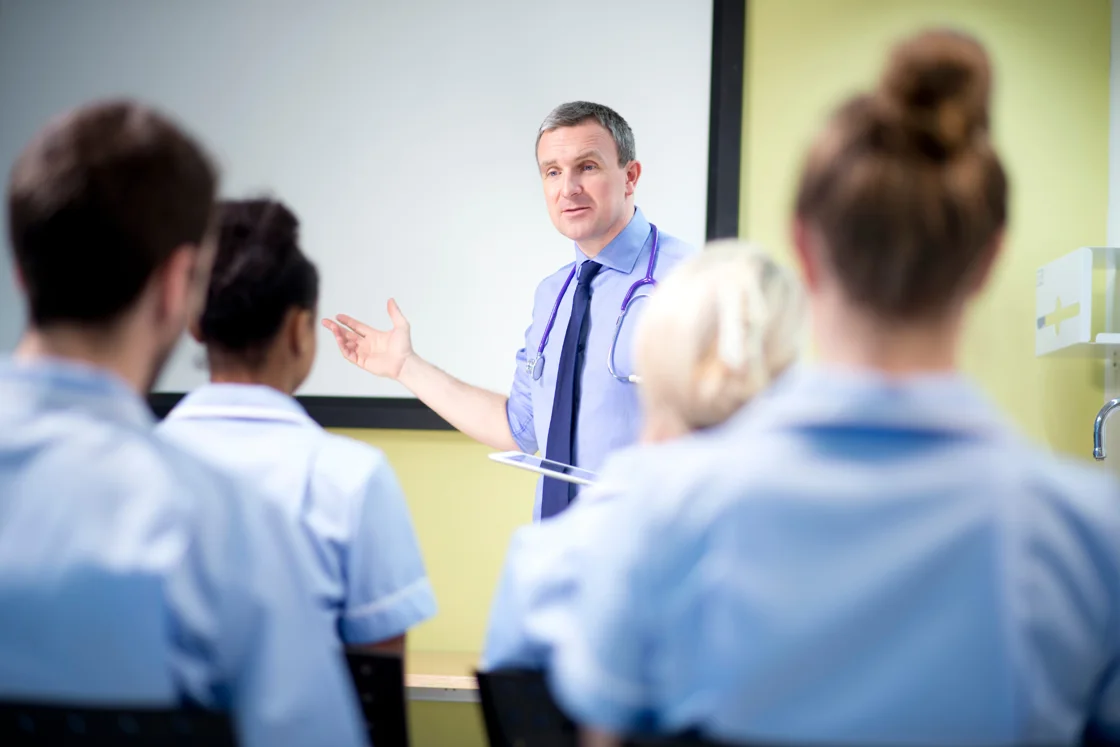The Royal College of Surgeons of Edinburgh (RCSEd) offers internationally recognised exams and courses for surgeons and dentists, including MRCS and MFDS. These qualifications and training programmes support career progression, uphold clinical excellence, and maintain the highest standards in patient care.
Exams
The Royal College of Surgeos of Edinburgh offers internationally recognised postgraduate examinations, including MRCS and MFDS, designed to support surgeons and dentists at every stage of their career. Our rigorous assessments set the benchmark for professional development and ensure the highest standards in surgical and dental practice and patient care.
Exam Calendar
View all available RCSEd exam diets listed by date or alphabetical name.
View calendarGlobally Recognised Surgical and Dental Exams
Select an exam from the categories, or search for a specific exam.
Search exams
MRCS Exam
The Membership of the Royal College of Surgeons (MRCS) exam is aimed at surgical trainees, testing core surgical competencies and knowledge. It is a crucial step towards specialty training.
Intercollegiate MRCS Part A
The Intercollegiate MRCS Part A exam is designed to assess the knowledge expected of a surgical trainee two to three years after qualification. It is a five-hour multiple choice question (MCQ) exam, comprising two papers taken on the same day: Paper 1 - Applied Basic Science and Paper 2 - Principles of Surgery in General.
Book hereIntercollegiate MRCS Part B - OSCE
The Intercollegiate MRCS Part B (OSCE) integrates basic surgical scientific knowledge and its application to clinical surgery. Its purpose is to build on the test of knowledge in Part A and assess how this is applied in clinically appropriate contexts. This is done through a series of stations reflecting elements of day-to-day clinical practice.
Book hereMFDS Exam
The MFDS (Membership of the Faculty of Dental Surgery) exam is designed for dentists in the early stages of their careers, assessing essential knowledge and skills for modern dental practice.
MFDS Part 1 Exam
Part 1 of the MFDS is a three-hour written examination comprising of 180 Single Best Answer (SBA) questions. This question paper is designed to test your knowledge and the deeper understanding and application of that knowledge in a clinical context.
Book hereMFDS Part 2 Exam
Part 2 of the MFDS is a two-hour Objective Structured Clinical Examination (OSCE), designed to assess your communication skills and your knowledge, understanding and management of a range of common conditions. The examination consists of 10 stations which are examined, plus a number of rest stations.
Book hereExam Information
Find all essential details for your exam journey, including the latest exam results, key policies and procedures, online application help, and FAQs.

RCSEd Diploma Ceremony
Diploma ceremonies are one of the most popular events in the College calendar. We understand the significance of coming together with your friends and family to celebrate your Diploma after the hard work, commitment, and dedication that you have put into getting to this stage of your career.
Find full details on how to attend your Diploma ceremony and what to expect on this special day with the Royal College of Surgeons of Edinburgh below.

How to Attend a Ceremony
Find details on how to book your diploma ceremony, select dates and prepare for your special day with the Royal College of Surgeons of Edinburgh.
Learn more
Ceremonial FAQs
Find answers to your questions about diploma certificates, ceremony details, guest policies, travel and more for RCSEd diploma ceremonies.
Read hereCourses
At the Royal College of Surgeons of Edinburgh (RCSEd) we run a broad portfolio of surgical and dental courses designed to advance your practical skills, deepen your knowledge and support your career at every stage - from early professional development to specialist training and leadership. Delivered across the UK and internationally, our courses span in-person workshops, online learning and blended programmes so you can learn where you are and move forward globally.
Course Calendar
View the course calendar to browse the diverse range of courses available at RCSEd.
View calendarCourses for every stage of your professional journey
Select a course from the categories, or search for a specific course.

Surgical Programmes
Future Leaders Programme for Surgeons
Future Leaders Programme (FLP) for Surgeons is a 12-month blended learning programme designed to support surgeons and dentists in becoming future leaders within their specialty. The programme is accredited by the Royal College of Surgeons of Edinburgh (RCSEd).
Learn more
External Courses
External Courses
Find surgical and dental courses from trusted external organisations. Submit your course for listing via the Education team’s application process.
Learn more
RCSEd Accreditation
RCSEd Educational Quality Assurance Services
The College has a longstanding reputation for offering the highest standards of surgical education and training activity, both nationally and internationally. To maintain and enhance these standards, we offer two quality assurance services through RCSEd CPD approval and RCSEd Accreditation for external educational activities.
Learn more

RCSEd Accredited Surgical Educational Activities
Having your surgical educational activity accredited by the College demonstrates that it meets the same rigorous internal quality assurance processes as those within the College’s educational portfolio.
Learn more
RCSEd Accredited Dental Educational Activities
Having your dental educational activity accredited by the College demonstrates that it meets the same rigorous internal quality assurance processes as those within the College’s educational portfolio.
Learn more
RCSEd Accredited Fellowships
Having your fellowship accredited by the College demonstrates that it meets the same rigorous internal quality assurance processes as those within the College’s educational portfolio.
Learn more
RCSEd Accredited Centres
Having a centre accredited by the College demonstrates that it meets the same rigorous internal quality assurance processes as the teaching spaces within the College.
Learn moreRCSEd Surgical Accreditation
The Royal College of Surgeons of Edinburgh will accredit various surgical educational activities of a sufficient quality and standing to allow educational providers and prospective students with a quality benchmark to demonstrate that an accredited activity meets the rigorous standards of the College.
Learn moreRCSEd Faculty of Dental Surgery Accreditation
The Faculty of Dental Surgery at the Royal College of Surgeons of Edinburgh will accredit courses and programmes of a sufficient quality and standing to allow educational providers and prospective students with a quality benchmark to demonstrate that an accredited activity meets the rigorous standards of the College.
Learn moreContact us
For any queries, please email the relevant department in the first instance:
- Courses: education@rcsed.ac.uk
- Accreditation: accreditation@rcsed.ac.uk
- Diploma Ceremonies: ceremonial@rcsed.ac.uk


